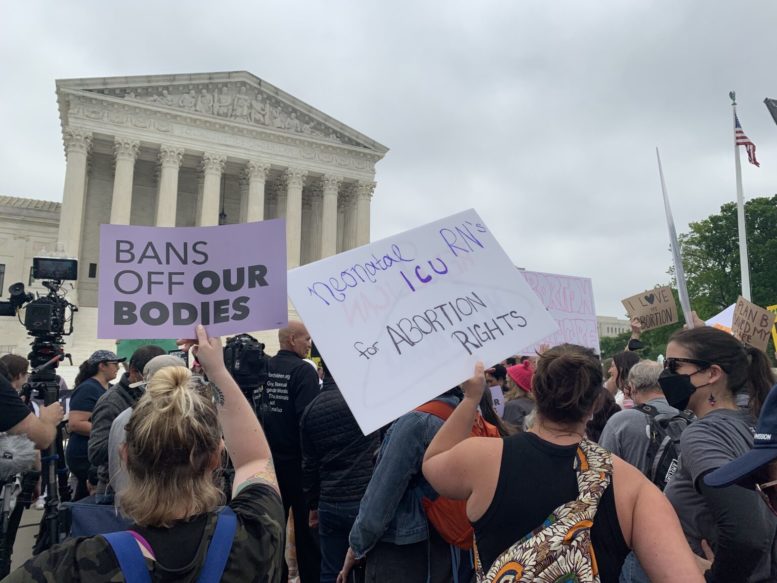BY SUSAN TEBBEN
The leak of a draft opinion appearing to spell drastic changes to abortion legalization in the country has caused many Ohio abortion advocates to accept what they’d been expecting for months.
Roe v. Wade may be overturned this summer by the U.S. Supreme Court, and rather than deny what they’ve anticipated since the court took up anti-abortion legislation in a number of states, Dr. Jessie Hill of Case Western Reserve University said a more realistic tack is necessary.
“I believe lawyers as well as providers and others have been preparing for this across the board,” Hill said. “The fight is not over, there are certainly going to be efforts to maintain the rights (laid out in Roe).”
Hill is associate dean for research and faculty development at CWRU’s school of law, works with the ACLU on abortion rights cases, and teaches classes on constitutional law, civil rights and reproductive rights.Though Hill says Ohioans are still due their abortion rights within the state until a decision is made official – abortion is legal in Ohio up to 20 weeks gestation and 9 abortion clinics are still open in the state – the changes that are indicated in the draft opinion from Supreme Court Justice Samuel Alito create more questions than answers.
“It’s a huge sea-change; it would be hard to overstate how much uncertainty this brings about,” Hill said.
Jaime Miracle, deputy director of Pro-Choice Ohio, said that’s one of the organizations’ biggest concerns with the potential for impending restrictions, nationally and on the state level.
“They want to ban abortion, but how are we going to support all these folks?” Miracle said. “If we do lose abortion access, how are these legislators going to do to support families?” READ MORE
Committee passes bill to block social media from ‘censoring’ users
An Ohio House committee passed legislation Tuesday prohibiting social media companies like Facebook, Twitter, and YouTube from “censoring” their users.
The legislation would block the companies from removing posts or expelling people from their platforms based on the “viewpoint” of users or ideas expressed in their posts. It wouldn’t apply to speech already illegal under federal law like harassment or inciting violence.
Passage comes as some of the large social media networks grapple with trends like widespread undermining among Republicans of the 2020 U.S. presidential election results, the proliferation of bunk health advice around the COVID-19 pandemic, and wholesale denial of the Holocaust.
Lawmakers in 16 other Republican states have introduced similar legislation, stemming from conservatives’ perception that social media companies disproportionately censor their views. In the last six months, federal judges in Florida and Texas have temporarily halted the only two such laws enacted thus far, ruling that they violate the First Amendment to the U.S. Constitution.
The Ohio legislation, House Bill 441, would allow private citizens to sue social media companies and win judgements if their views are “censored.” This includes blocking, banning, demonetizing, deplatforming, removing, denying “equal access or visibility to,” or otherwise “discriminating” against the user based on what they post. The bill prohibits the companies from creating any kind of waiver for users to sign to circumvent the censorship law. It only applies to companies with at least 50 million users. READ MORE
Ohio Redistricting Commission members maintain innocence on contempt
Current and former members of the Ohio Redistricting Commission have defended themselves against allegations of contempt of the Ohio Supreme Court, despite saying the claims are moot now that the commission has adopted a map before the deadline.
Court challengers had asked the Ohio Supreme Court to revisit contempt allegations in legislative redistricting cases. The request came at the end of April, well before the May 6 deadline the supreme court gave the commission to adopt a new map.
The ACLU filed the challenge on behalf of anti-gerrymandering groups like the League of Women Voters of Ohio. The request acknowledged that the deadline had not passed for the ORC, but that the situation’s urgency – passing legislative maps to be used for an Aug. 2 primary – had “dramatically increased” with the decision by a federal court to use the third set of maps adopted by the commission if no map is approved by May 28.
But GOP commission members argued in recent court filings that just because plaintiffs wanted a quicker process doesn’t mean the commission has to listen.
“The only deadline this Court set in that order was the May 6, 2022, deadline to file the ‘entirely new General Assembly-district plan’ that the reconstituted and convened Commission drafts and adopts,” wrote attorneys for Senate President Matt Huffman and House Speaker Bob Cupp.
The commission – minus Huffman and Cupp, who replaced themselves with other legislators for the last two days before the deadline – passed a map on Thursday, prior to the May 6 deadline, but even they didn’t argue that the maps were “entirely new,” as ordered by the court. It was the same maps the commission had passed in their third, February attempt, and has already been rejected by the court as unconstitutional. READ MORE

